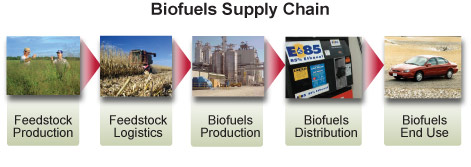The Biomass Program uses the terms "Demonstration and Deployment" to describe on-the-ground activities, including biorefinery plant construction and operation. Engaging in actual fuel and co-product refining is a key segment of the Program's work toward increased biofuels production and use. In partnership with industry, deployment activities engage participants across a variety of available technologies and feedstocks, in the quest to develop clean, affordable, sustainable alternative fuels.

Information about the Biomass Program's complementary Research and Development activities, including detailed discussion of internal biorefinery and infrastructure efforts, can be found on this Web site's Technologies page.
Information about current funding opportunities for Demonstration and Deployment can be found on this Web site's Financial Opportunities page.
Map of DOE Cellulosic Biorefinery Deployment Projects (PDF 104 KB)
Integrated Cellulosic Biorefineries
On February 28, 2007, DOE selected six biorefinery projects to develop commercial-scale integrated biorefineries demonstrating the use of a wide variety of cellulosic feedstocks such as corn fiber, wood wastes, agriculture residues, municipal solid wastes and potential energy crops. The goal is to demonstrate that integrated biorefineries can operate profitably once their construction costs are covered and can be replicated. DOE will invest up to $385 million in the six projects over the next four years. When fully operational, these facilities will be capable of producing more than 130 million gallons of ethanol per year.
While the refining process for cellulosic ethanol is more complex than that of corn-based ethanol, cellulosic ethanol yields a somewhat greater net energy benefit and results in lower greenhouse gas emissions. Of the six selected companies, four—BlueFire Ethanol, Inc., Poet, Iogen Biorefinery Partners, and Abengoa Bioenergy—will principally utilize biochemical processes to free the sugars from the biomass and then ferment them into alcohol. The two remaining companies, Range Fuels and Alico plan to use thermochemical processes to first gasify the biomass into a "synthesis gas." The synthesis gas will then be further converted to biofuels.
Current information about the projects and partner companies can be found on this Web site's Financial Opportunities page.
Ten Percent Validation - Small-Scale Cellulosic Biorefineries
On January 29, 2008, the Department of Energy (DOE) announced it will provide up to $114 million, over four years, to support the development of small-scale cellulosic biorefineries. The projects will develop biorefineries at 10% of commercial scale that produce liquid transportation fuels as well as biobased chemicals and bioproducts used in industrial applications. Projects selected to negotiate awards will use novel approaches and a variety of cellulosic feedstocks to test new conversion processes. Combined with industry cost share, more than $331 million will be invested in these four projects.
Current information about the projects and partner companies can be found on this Web site's Financial Opportunities page.









